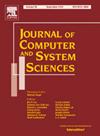几乎聚类图和分裂图中支配集变量的参数化复杂度
IF 0.9
3区 计算机科学
Q1 BUSINESS, FINANCE
引用次数: 0
摘要
研究了参数生态规划中支配集的几种变体的结构参数化问题。我们给出了改进的FPT算法和已知猜想下的支配集及其变体在离聚类图或分裂图有k个顶点的图中的下界。这些图中有一组k个顶点(称为调制器),删除这些顶点会产生聚类图或分割图。我们也称k为删除距离(到相应的图类)。例如,我们证明了当用删除距离k参数化聚类图时:支配集、独立支配集、支配团、有效支配集和总支配集可以在3knO(1)时间内求解。此外,当以分割图的删除距离k作为参数化时,我们证明了有效支配集可以在3k/2nO(1)时间内解决,打破了2k的障碍。本文章由计算机程序翻译,如有差异,请以英文原文为准。
Parameterized complexity of dominating set variants in almost cluster and split graphs
We consider structural parameterizations of several variants of Dominating Set in the parameter ecology program. We give improved FPT algorithms and lower bounds under well-known conjectures for Dominating Set and its variants in graphs that are k vertices away from a cluster graph or a split graph. These are graphs in which there is a set of k vertices (called the modulator) whose deletion results in a cluster graph or a split graph. We also call k as the deletion distance (to the appropriate class of graphs). For example, we show that when parameterized by the deletion distance k to cluster graphs: Dominating Set, Independent Dominating Set, Dominating Clique, Efficient Dominating Set and Total Dominating Set can be solved in -time. Additionally, when parameterized by the deletion distance k to split graphs, we prove that Efficient Dominating Set can be solved in -time breaking the barrier.
求助全文
通过发布文献求助,成功后即可免费获取论文全文。
去求助
来源期刊

Journal of Computer and System Sciences
工程技术-计算机:理论方法
CiteScore
3.70
自引率
0.00%
发文量
58
审稿时长
68 days
期刊介绍:
The Journal of Computer and System Sciences publishes original research papers in computer science and related subjects in system science, with attention to the relevant mathematical theory. Applications-oriented papers may also be accepted and they are expected to contain deep analytic evaluation of the proposed solutions.
Research areas include traditional subjects such as:
• Theory of algorithms and computability
• Formal languages
• Automata theory
Contemporary subjects such as:
• Complexity theory
• Algorithmic Complexity
• Parallel & distributed computing
• Computer networks
• Neural networks
• Computational learning theory
• Database theory & practice
• Computer modeling of complex systems
• Security and Privacy.
 求助内容:
求助内容: 应助结果提醒方式:
应助结果提醒方式:


